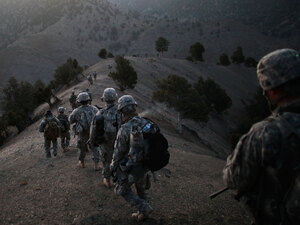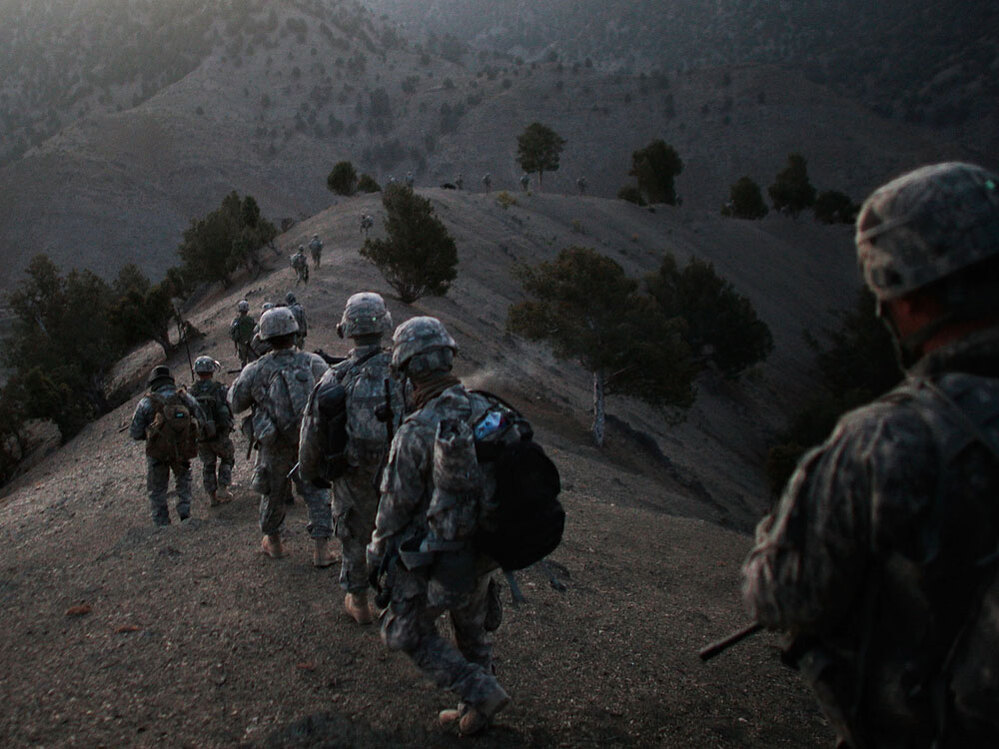Pakistan Hemmed In By U.S. And Afghanistan

U.S. soldiers march along a mountain ridge in a Taliban stronghold area in Afghanistan's Paktika province, near the border with Pakistan, on Oct. 15. Pakistan is eagerly awaiting President Obama's decision on Afghanistan strategy.

U.S. soldiers march along a mountain ridge in a Taliban stronghold area in Afghanistan's Paktika province, near the border with Pakistan, on Oct. 15. Pakistan is eagerly awaiting President Obama's decision on Afghanistan strategy.
Pakistan is anxiously awaiting President Obama's announcement next week on a new U.S. strategy in Afghanistan. Pakistanis worry that any surge in U.S. troops would widen the war across their western border.
But many are also eager to see an American commitment in Afghanistan robust enough to convince the Taliban to sit down and talk.
When it comes to Washington's conduct in Afghanistan, many Pakistanis hold an attitude similar to that of journalist Najam Sethi. After 10 years, Sethi says, the U.S. has very little to show for its Afghan strategy.
Sethi, editor of the Lahore-based Daily Times newspaper, acknowledges that the U.S. may have been busy elsewhere — Iraq, for instance. "But when you get into projects like this, you can't say, 'Oh, we were busy somewhere else,' " he says.
Retired Pakistani Brig. Javed Hussain says the Americans are stuck in a protracted war next door because, like the Soviets before them, they failed to secure the Afghan-Pakistan border, which allowed the Taliban to escape into Pakistan and regroup.
"The only option that the Americans have now is to adopt an offensive strategy that will aim at defeating the Taliban within a year," Hussain says.
He says that would likely require thousands more troops than those contemplated by even the most hawkish U.S. recommendations.
"Whether it's 100,000 troops or whatever, finish it off, and prove history wrong that invaders in Afghanistan have always failed. Unless you eliminate the Taliban, you will never win," he says.
40,000 Troops A 'Speck'
The former chief secretary of Pakistan's Northwest Frontier province, Khalid Aziz, says the U.S. is unlikely to make much headway either in nation-building or in counterinsurgency over the course of the next year. He says even the 40,000 additional troops requested by Gen. Stanley McChrystal, the top U.S. commander in Afghanistan, wouldn't turn things around.
"To me, it looks like a speck, so I would be very worried if I were President Obama to move forward with that," Aziz says.
But regardless of its size, Aziz says, any surge in U.S. troops magnifies problems for Pakistan. He says even a modest contingent of 12,000 troops deployed in the southern region near Kandahar would push the violence in Afghanistan over the porous border into Baluchistan, Pakistan's southwest province, which is already a hot spot of Afghan refugees, local separatists and Taliban.
Aziz says if more militants seek protection inside Baluchistan, the smoldering province could burst into flames.
"If [the war] expands into Pakistan, my fear is that some of these people might start getting into Karachi and the port. If that begins to happen, then their whole trail starts destabilizing the neighborhood wherever they move," he says.
U.S. Departure Would Be Destabilizing
While a surge of U.S. troops unsettles Pakistan, so does the prospect of a quick American withdrawal from Afghanistan. Retired diplomat Tariq Fatemi says any decision to leave Afghanistan is potentially destabilizing.
"The minute the Americans are seen to have now reached the point where they have started packing — even though the packing process could take 18 months — it will be a different ballgame. And even the inclination on the part of the Taliban to play ball will be immediately lessened," Fatemi says.
The widely held view in Pakistan is that only a political settlement will resolve the Afghan morass. Aziz, the former Northwest Frontier official, says it is time to begin to engage and perhaps confine the militants through talks.
"After all, they are also human beings, they are also thinking of a future. They can't be fighting all their life," he says.
Aziz says in the absence of any political settlement, a U.S. pullout would spell civil war inside Afghanistan — and disaster for Pakistan, as extremists infiltrate the borders.
"Pakistan would be left with these nutcases to face. If you are going to be left with them, how are you going to coexist with them?" he says.
Aziz says you coexist by being a good neighbor — hence Pakistan's longstanding reluctance to alienate the Afghan Taliban.
Farahnaz Ispahani, a parliamentarian of Pakistan's ruling People's Party, acknowledges that the country shares longstanding ties with the Taliban that she says should be exploited by the United States.
"Those relationships exist. So why not allow us to play a role of bridge between two sides which have very little confidence in each other?" Ispahani says.
She says Pakistan must be involved in any political settlement in Afghanistan, because whatever decision the United States makes, Pakistan will have to live with.




Comments
Please note that all comments must adhere to the NPR.org discussion rules and terms of use. See also the Community FAQ.
You must be logged in to leave a comment. Login | Register
More information is required for you to participate in the NPR online community. Add this information
NPR reserves the right to read on the air and/or publish on its Web site or in any medium now known or unknown the e-mails and letters that we receive. We may edit them for clarity or brevity and identify authors by name and location. For additional information, please consult our Terms of Use.